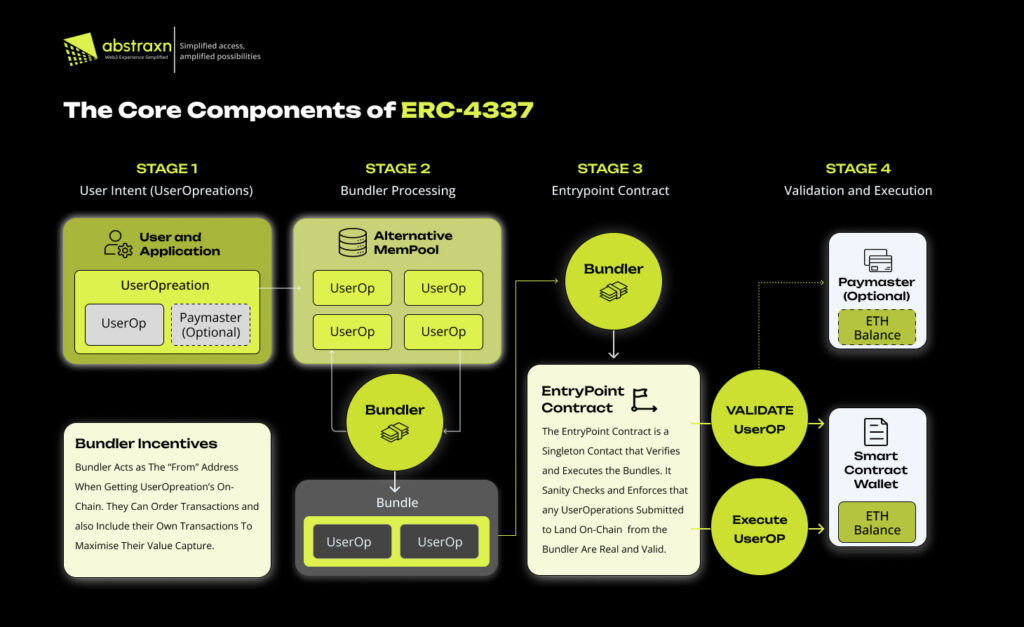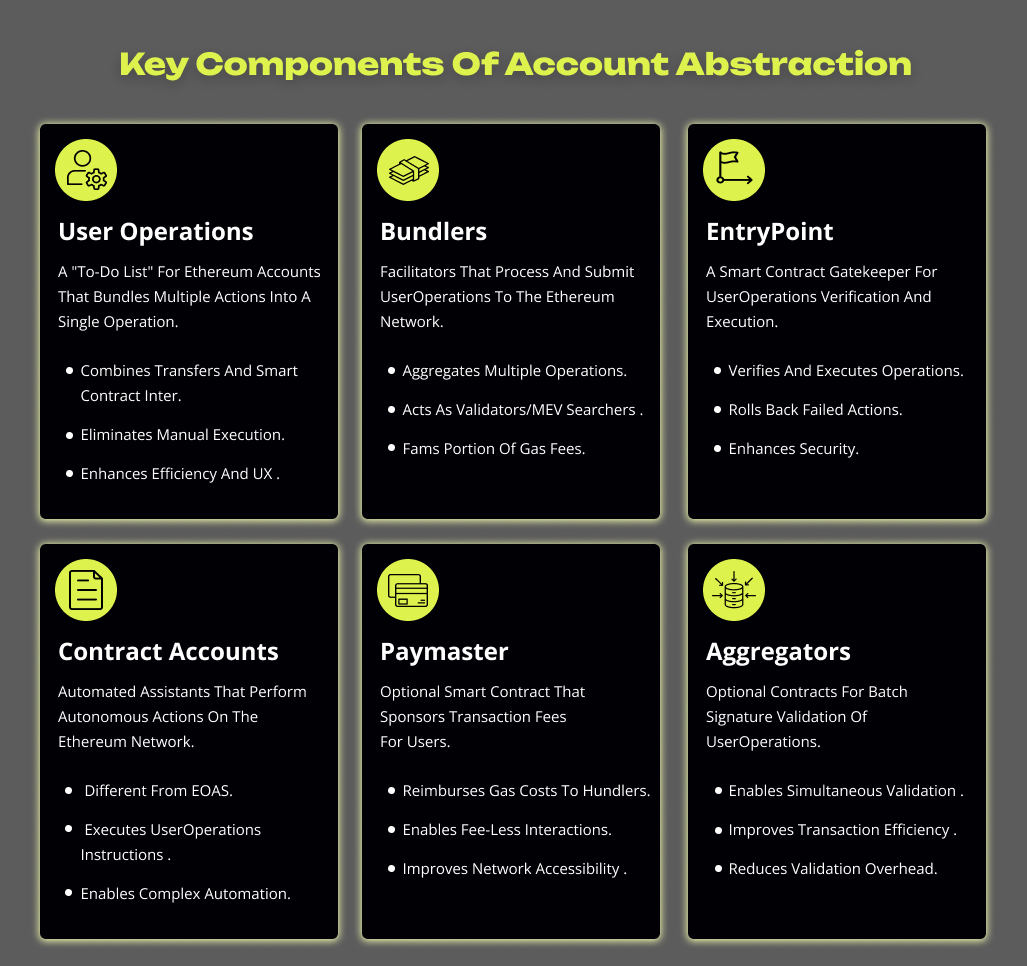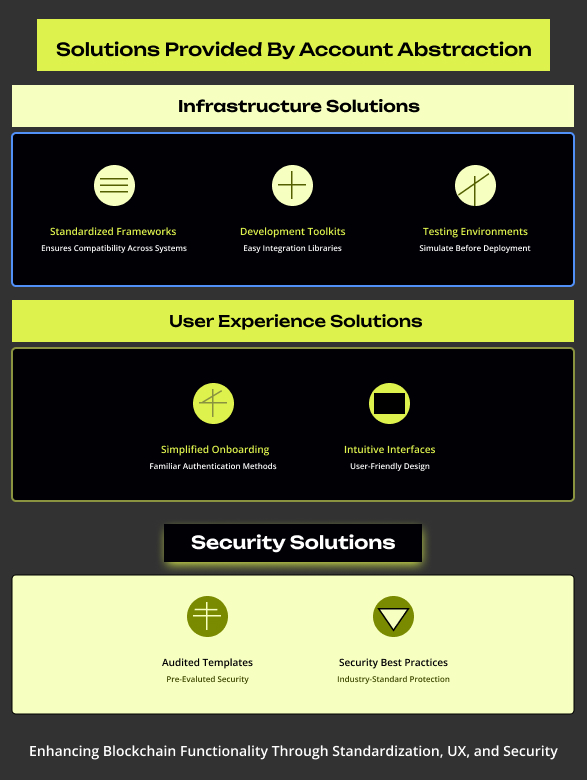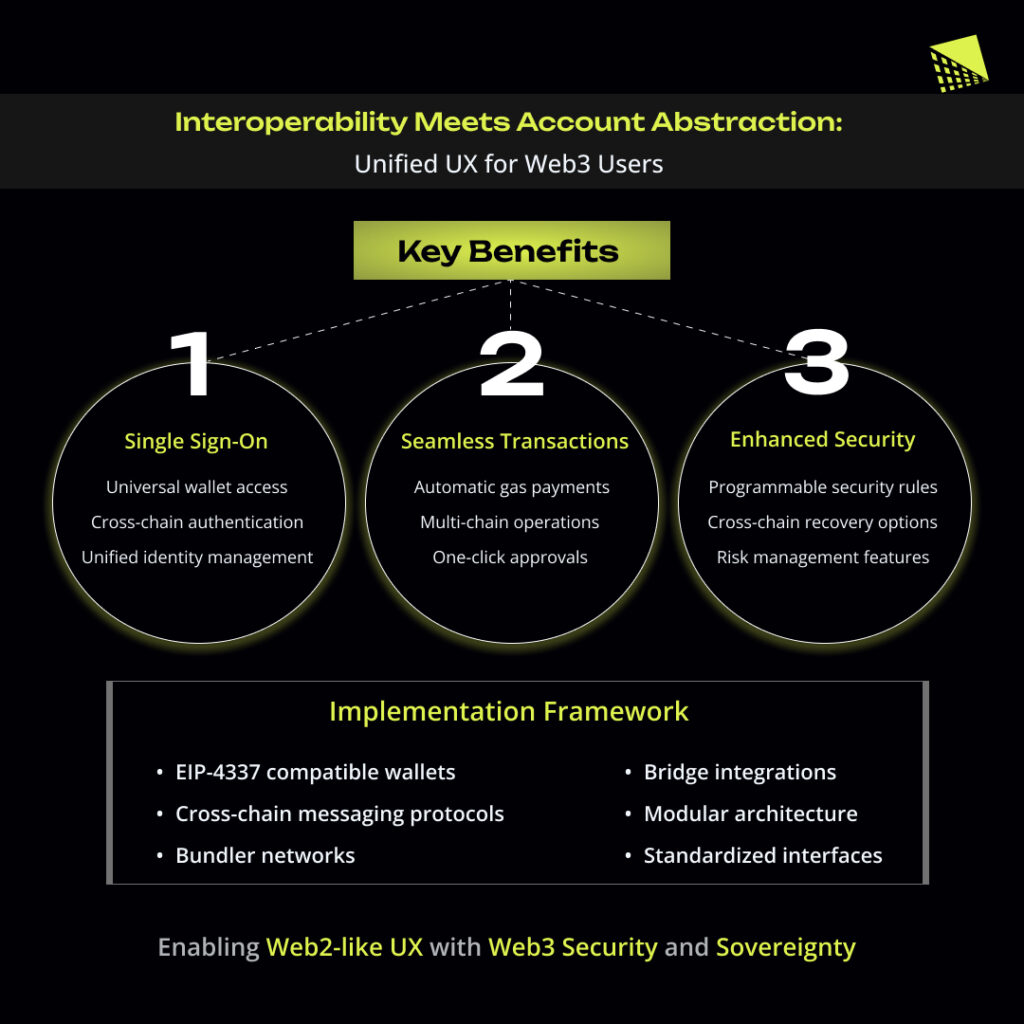Traditional methods work fine for common transactions, but they have numerous limitations that increase the risk of theft and data breaches. On the other hand, the Blockchain world has a steep learning curve filled with complex wallets, gas fees, and private keys.
Enter Account Abstraction, emerging as a promising solution, bridging the gap between Web2 ease and Web 3’s security to make easy and flexible digital payments across decentralized platforms.
Say goodbye to hefty gas fees and complicated transaction processes. With our Account Abstraction solutions, experience seamless, cost-efficient Web3 interactions without worrying about gas costs.
Challenges in Current Blockchain Account Models
To understand account abstraction’s significance, it’s crucial to know the backstory aka problem statement.
Currently, most blockchain networks operate with two types of accounts:
- Externally Owned Accounts (EOAs): Controlled by private keys, limited to basic operations.
- Smart Contract Accounts: Programmatic accounts that can contain complex logic but traditionally couldn’t initiate transactions.
And, in decentralized applications, numerous friction points compromise its usability and widespread adoption.
- The multi-step process required to create wallets.
- Dependency on Externally Owned Accounts (EOAs).
- Complex seed phrases that demand strict security measures.
- Process of converting fiat to cryptocurrency for transactions.
- High gas costs for every transfer.
- There is an additional need to cover these fees using the native tokens of specific dApps.
How Does Abstraction/ ERC 4337 Offer a Convenient Solution?
Account Abstraction enables developers to Customize blockchain transactions programmatically based on the Terms and conditions of Smart contracts. It allows users to use smart contract accounts as primary user accounts and execute transactions beyond traditional rules on the EVM network.
On networks like Ethereum, transactions are valid if they meet conditions like sufficient gas balance, correct nonce, and valid signature. Account abstraction lets developers create on-chain accounts with customized logic and conditions for transaction execution.
Account Abstraction In Web3 Interactions: Smart Contract Wallets and UserOps
Smart contracts work beyond the fixed logic of EOA accounts, and UserOps are the data objects that hold all the details required for transaction execution on EVM logic. A service named “Bundler” tracks the UserOps and pushes them to Smart Contract ( also known as Entry Point Contract) which creates transactions on the EVM network.

Why Account Abstraction Matters?
“ If it’s not your keys, it’s not your wallet”, and losing them makes your wallet unrecoverable along with the funds in it. Limited capabilities of EOAs restrict the wide user adoption. Moreover, these accounts lack user control granularity, which means, developers cannot implement spending policies or rules and Account Abstraction makes it possible.
Not just that, Account Abstraction contributes to improving User Experience with:
- Sponsored Gas Fee:
Account Abstraction enables the developers to program smart contacts to pay Gas Fees for their users. It sponsors gas fees through a mechanism that allows third parties, known as Paymasters, to cover transaction costs.
- ERC 20 Tokens For Gas Fee Payment:
With Account Abstraction, users can pay Gas Fees in ERC 20 tokens instead of being restricted to the native cryptocurrency, which can simplify transactions and reduce costs.
- Batch Transactions:
Developers can bundle multiple transactions into a single transaction for trade execution on Decentralized platforms and make batch payments.
- Wallets-Login:
Users can interact with any dApp platform without a wallet using Account Abstraction. They can simply use their social media account or email to log in.
Key Components of Account Abstraction
- UserOperations
UserOperations act as a “to-do list” for Ethereum accounts, allowing users to bundle multiple actions—such as transferring funds or interacting with smart contracts—into a single operation. This streamlines the transaction process, eliminating the need to manually execute each action individually, thus enhancing efficiency and user experience.
- Bundlers
Bundlers are facilitators that take UserOperations and submit them to the Ethereum network. They aggregate multiple UserOperations into a single transaction, optimizing the submission process. By acting as validators or MEV searchers, Bundlers ensure that transactions are efficiently processed while earning a portion of the gas fees for their services.
- EntryPoint
The EntryPoint is a smart contract that serves as a gatekeeper for UserOperations submitted by Bundlers. It verifies and executes these operations, ensuring transaction integrity by rolling back any failed actions. This centralization simplifies the transaction logic and enhances security within the Ethereum ecosystem.
- Contract Accounts
Contract Accounts function like automated assistants on the Ethereum network. Unlike externally owned accounts (EOAs), they can autonomously perform actions based on received instructions from UserOperations. This capability allows for greater automation and simplifies complex transactions, making them more efficient.
- Paymaster
The Paymaster is an optional smart contract that can sponsor transaction fees on behalf of users. It reimburses Bundlers for gas costs, allowing users to interact with the network without needing tokens for fee payments. This flexibility enhances accessibility and user experience in blockchain interactions.
Abstraxn delivers seamless blockchain solutions with precision and speed. Leverage Account Abstraction to streamline transactions, enhance security, and optimize scalability—all with rapid execution. No delays, no friction—just efficient blockchain interactions that drive real results.
- Aggregators
Aggregators are optional contracts that assist Contract Accounts in validating signatures from multiple User Operations simultaneously. This feature improves transaction efficiency by enabling batch processing and reducing the overhead associated with individual signature validations, further streamlining operations within the account abstraction.

Account Abstraction: Understanding The Broader Framework
Here are the key features along with their role:
Signature Abstraction: Redefining Authentication
- Problem: EOA relies solely on ECDSA signatures, exposing users to phishing attacks, malware, and irreversible asset loss.
- Solution: Smart contract wallets enable custom authorization rules through signature abstraction, such as multi-factor authentication, biometric verification, and hardware wallet integration.
Fee Abstraction: Democratizing Transaction Economics
- Problem: Transactions on blockchains require gas fees paid exclusively in native tokens, limiting accessibility.
- Solution: Fee abstraction allows payments in alternative tokens or via third-party sponsors, enabling gasless transactions and subscription models.
Nonce Abstraction: Reimagining Transaction Sequencing
- Problem: Blockchain systems enforce rigid first-in-first-out processing, resulting in inefficient transaction handling.
- Solution: Nonce abstraction supports parallel processing, intelligent transaction queuing, and batch execution, enhancing transaction management
Account Abstraction: Benefits and Opportunities
- Enhanced Flexibility
Account abstraction allows developers to create smart contract wallets that can implement flexible security rules and manage user accounts more effectively. This flexibility enables tailored solutions that meet specific user needs, enhancing overall application functionality.
- Simplified User Experience
By abstracting complex blockchain interactions, developers can create applications that are easier for users to navigate. This simplification reduces the learning curve for new users, making Web3 applications more accessible.
- Customizable Security Features
Developers can define unique security protocols within smart contract wallets. This customization enhances security while providing users with greater control over their assets.
- Reduced Reliance on Private Keys
With account abstraction, the need for users to manage private keys diminishes. Developers can implement alternative authentication methods, such as biometric or social recovery, enhancing security and user convenience.
- Improved Interoperability
Smart contract wallets designed with account abstraction can interact seamlessly with various dApps and protocols. This interoperability fosters a more cohesive ecosystem, encouraging developers to build on existing solutions without compatibility concerns.
- Lower Entry Barriers for Users
By eliminating the need for users to understand gas fees and transaction complexities, account abstraction lowers entry barriers. This encourages broader adoption of Web3 applications and expands the potential user base for developers.
- Future-Proofing Applications
Implementing account abstraction prepares applications for future advancements in blockchain technology. As the ecosystem evolves, developers can adapt their solutions without significant overhauls, ensuring longevity and relevance in a competitive market.
Use Cases of Account Abstraction
Strengthening Wallet Security and Recovery
- Multi-Signature Authorization for Transactions:
For wallets used by DAOs, organizations, or businesses, ensuring that no single party can independently authorize transactions is vital. With account abstraction, users can set up multi-signature wallets where a predefined number of signatories are required to approve any transaction. This method significantly enhances the security of wallets associated with multiple stakeholders.
- Social Recovery Mechanism:
Unlike conventional EOAs that depend solely on a private key, smart accounts enable a flexible recovery process. Social recovery allows users to assign trusted guardians, such as other devices or individuals, who can help regain access to the wallet if the original key is lost. This recovery method provides both security and reassurance for users.
Advanced Smart Contract Interactions
- Whitelisting Specific Smart Contracts or Accounts:
Account abstraction introduces the ability to create a whitelist of authorized smart contracts, allowing users to control which accounts or contracts they can interact with. For example, a corporate account could be limited to transactions only with employees, preventing any unauthorized transfers or hacks.
- Batching Multiple Transactions:
Certain Web3 actions involve multiple steps, such as approving a token and confirming a transaction. Account abstraction allows users to combine these steps into a single transaction. By grouping operations, users not only streamline their experience but also reduce gas fees, optimizing the overall process.

Enhancing Web3 Security Features
- Temporary Access with Session Keys:
Traditional models require constant access to a private key. With session keys, users can create temporary credentials to access their accounts for a set duration or number of actions. This feature limits the exposure of sensitive keys, ensuring that any compromised session key can only be used for a short period or a specific set of tasks.
- Customized User Roles and Permissions:
Account abstraction allows for flexible management of user permissions within a wallet. Wallet owners can define roles like ‘admin,’ ‘user,’ or ‘auditor,’ and dynamically adjust access based on requirements. This feature is especially valuable for organizations that need to manage multi-user wallets with varying levels of control.
- Setting Transaction and Spending Limits:
Account abstraction gives users the power to establish limits on how much can be spent or transferred over a specific period. This safeguard helps mitigate the impact of a compromised account, and users can set higher approval thresholds for larger transactions, adding an extra layer of security.
Optimizing Gas Fees and Payment Options
- Using Custom Tokens for Gas Fees:
Typically, Ethereum transactions require ETH to pay gas fees, but account abstraction introduces flexibility by allowing users to pay with alternative tokens. This innovation enables users to avoid the need for ETH in their accounts to perform transactions, making the system more accessible and user-friendly.
- Subsidized Gas Costs for Better User Experience:
Web3 platforms and dApps can choose to cover transaction gas fees for their users. This feature is particularly useful in scenarios like NFT minting or airdrop claims, where the platform absorbs the network fee to simplify the process for users, removing the barrier of transaction costs.
Read Also: How To Use Passkeys On Ethereum
Comparative Analysis: Traditional Accounts and Abstracted Accounts:
Here is a comparison between traditional accounts and abstracted accounts:
| Features | Externally Owned Accounts (EOAs) | Account Abstraction (AA) |
|---|---|---|
| Control | Private keys | Smart contracts |
| Security | Limited | Multi-signature, customizable |
| User Experience | Complex | Simplified, gasless transactions |
| Recovery Options | None | Social recovery mechanisms |
| Book intro call with us | ||
Solutions Provided by Account Abstraction
AA introduces a range of solutions that enhance the functionality and usability of blockchain applications. These solutions can be categorized into three main areas: Infrastructure Solutions, User Experience Solutions, and Security Solutions.
- Infrastructure Solutions
Account Abstraction provides several frameworks and tools that standardize and streamline the development process for blockchain applications:
- Standardized Implementation Frameworks: These frameworks facilitate the consistent application of Account Abstraction principles across various projects, ensuring compatibility and interoperability among different blockchain systems.
- Development Toolkits and Integration Libraries: AA offers comprehensive toolkits that include libraries for developers to easily integrate Account Abstraction features into their applications, reducing the complexity of coding from scratch.
- Testing Environments for Developers: Dedicated testing environments allow developers to simulate and test their applications under different scenarios, ensuring that they function correctly before deployment.
- User Experience Solutions
Account Abstraction significantly improves the user experience by simplifying interactions with blockchain technologies:
- Simplified Onboarding Flows: AA enables more intuitive onboarding processes that utilize familiar authentication methods, making it easier for new users to engage with blockchain applications without extensive prior knowledge.
- Intuitive Interfaces: The design of user interfaces is enhanced to be more user-friendly, reducing the intimidation factor often associated with blockchain technology. This encourages broader adoption by making applications accessible to a wider audience.
- Security Solutions
Security is a paramount concern in blockchain applications, and Account Abstraction addresses this through:
- Audited Smart Contract Templates: These templates are pre-evaluated for security vulnerabilities, providing developers with a reliable starting point for building secure applications.
- Security Best Practices: AA promotes the adoption of industry-standard security practices to ensure robust mechanisms for account recovery and transaction monitoring, thereby enhancing user trust in the system.

Account Abstraction Case Studies in Action
- Visa’s Paymaster Contracts
Visa has conducted experiments with Paymaster contracts to simplify blockchain interactions and enhance the user experience for on-chain payments. These contracts allow users to pay transaction fees using various digital currencies, which are then converted into the blockchain’s native token for gas fees. Additionally, the Paymaster can sponsor gas fees, enabling users to perform transactions without needing to hold the native token in their wallets.
- Safe (Formerly Gnosis Safe)
Safely utilizes a multi-signature scheme that requires multiple approvals for transactions, thereby reducing the risk of aunauthorized access. By integrating the ERC-4337 standard, Safe enables users to create smart contract wallets with customizable transaction authorization rules, such as spending limits, enhancing overall security.
- Argent on StarkNet
Argent has introduced a social recovery feature on StarkNet, allowing users to retrieve lost private keys through designated “guardians” or by using their email and phone number for off-chain recovery. This innovative approach incorporates a familiar two-factor authentication mechanism, making it easier for users to regain access to their wallets.
- Braavos Wallet
Braavos has implemented signature abstraction, allowing users to tailor their transaction verification processes. The wallet supports biometric identity authentication, enabling access through facial recognition or fingerprint scanning, thus providing a secure and user-friendly experience.
Visa’s Delegable Accounts for Automatic Payments
Visa has also showcased a solution for automatic payments in self-custodial wallets. This feature allows users to set up recurring payments based on predefined conditions without requiring manual approval each time. This capability emphasizes convenience and the potential for real-world applications in programmable payments.
Future Trends and Research Directions
- Mass Adoption Potential
With simplified user experiences and reduced technical barriers, account abstraction holds great promise for mass adoption in Web3 applications.
- Innovation Opportunities
The technology opens doors for new business models, advanced financial products, cross-chain applications, and enterprise solutions that leverage its capabilities.
- Ecosystem Development
Ongoing standardization efforts, tool development, infrastructure improvements, and integration frameworks will be crucial for fostering an ecosystem supportive of account abstraction innovations.
- Community and Ecosystem Involvement
The success of account abstraction will also depend on active community engagement and collaboration among developers. Open-source projects and community feedback will play vital roles in shaping future developments and ensuring that user needs are met effectively.
- Web3 Wallets
As Web3 adoption grows, the evolution of Web3 wallets is accelerating to meet the demand for better security, usability, and flexibility. Traditional wallets, reliant on seed phrases and private keys, often create barriers for mainstream users. However, with account abstraction, Web3 wallets are transforming into smart, user-friendly solutions.
- Gasless Transactions – Users can interact with dApps without worrying about gas fees, as sponsor gas fees models become more common.
- Social Recovery Mechanisms – Instead of losing access due to a misplaced private key, users can recover their wallets via trusted contacts.
- Multi-Signature & Custom Rules – Web3 wallets will offer multi-sig approvals, time-locked transactions, and spending limits for better security.
- Seamless User Experience – Abstracting away blockchain complexities ensures onboarding becomes as simple as signing into a Web2 app.
With these innovations, Web3 wallets are shifting from complicated, developer-centric tools to intuitive, mainstream-ready solutions. Account abstraction is the key to bridging the gap between decentralization and mass adoption.
Read Also: Smart Wallets of the Future: AI and Account Abstraction in Web3
Take Away
Account abstraction represents a fundamental shift in how users interact with blockchain networks. By abstracting away technical complexities while maintaining security and decentralization, AA paves the way for mainstream Web3 adoption. As the technology matures and ecosystem support grows, we can expect increasingly sophisticated applications that leverage account abstraction to deliver seamless user experiences while maintaining the core benefits of blockchain technology. The success of account abstraction will largely depend on the continued development of standards, tools, and infrastructure, along with education and adoption by both developers and users. Projects like ERC-4337 are already laying the foundation for this transformation, setting the stage for the next generation of Web3 applications.
AbstraXn: Simplifying Blockchain, Redefining Possibilities
At Abstraxn, we believe blockchain interactions should be as seamless and intuitive as using any modern app. Our Account Abstraction solutions eliminate the complexities of private key management, gas fees, and transaction errors, empowering both developers and users. Whether it’s streamlining dApp logins, automating transactions, or enhancing security with multi-factor authentication, we make Web3 accessible and efficient. From small businesses to enterprise-level projects, our cutting-edge infrastructure ensures a frictionless user experience, fosters innovation, and accelerates blockchain adoption across industries. Join us in simplifying blockchain and unlocking a world of new possibilities.
Solutions Are Provided By Abstraxn’s Account Abstraction In Web3

- Modular Smart Accounts: Redefining Blockchain Interaction
AbstraXn’s Modular Smart Accounts transform how users engage with decentralized platforms. By bundling and forwarding multiple UserOperations across distinct mempools to the EntryPoint contract, we provide:
- Flexible account management
- Customizable transaction logic
- Seamless integration with existing blockchain infrastructure
Key Benefit: Developers can now create tailored wallet solutions that adapt to specific use cases, breaking free from traditional blockchain constraints.
- Paymaster: Democratizing Transaction Accessibility
Our innovative Paymaster solution revolutionizes Ethereum interactions by:
- Sponsoring gas fees for users without ETH
- Eliminating financial barriers to entry
- Enabling gasless transactions for enhanced user experience
Strategic Advantage: We remove the most significant friction point in blockchain adoption-unpredictable and expensive transaction costs.
- Bundlers as a Service: Optimizing Network Efficiency
Abstraxn’s Bundler service provides a robust mechanism to:
- Aggregate multiple UserOperations
- Efficiently forward transactions to EntryPoint contracts
- Reduce network congestion
- Minimize individual transaction overhead
Abstraxn streamlines every aspect of your blockchain transactions with Account Abstraction technology. From seamless smart contract execution to enhanced security and scalability, we ensure smooth, efficient, and gas-optimized operations.






